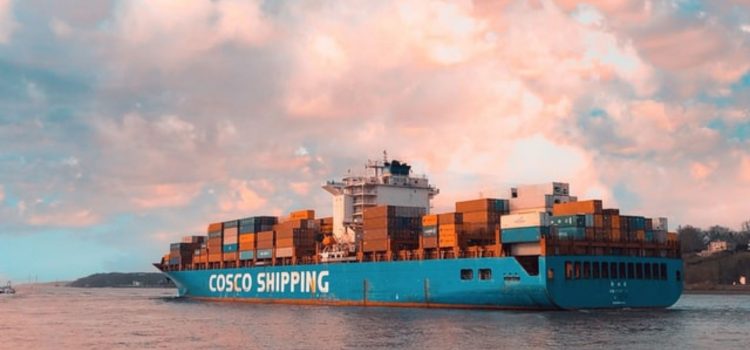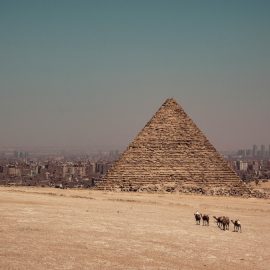

This article is an excerpt from the Shortform book guide to "Naked Economics" by Charles J. Wheelan. Shortform has the world's best summaries and analyses of books you should be reading.
Like this article? Sign up for a free trial here .
Is global trade increasing? What role does international trade play in a country’s economy?
To a large extent, the world is economically interdependent. Exports have increased from 8 percent of global GDP in 1950 to 25 percent today, meaning that countries are trading many more of their goods and services abroad. Overall, international trade makes all the countries involved richer and raises their standards of living, be they rich or poor to start with.
In this article, we’ll look at the economics of international trade, and how it can be used to improve living standards around the world.
What Is the Role of International Trade in an Economy?
Some of the ways in which international trade can improve people’s standards of living include:
- Lowering the cost of goods, which has the same practical effect as increasing people’s incomes
- Increasing access to a variety of goods
- Increasing productivity through specialization: Trade frees people up to focus their efforts where they can be most effective. For example, if you buy a car that someone else built rather than building a car for yourself, you will not only get a better car, but you will have time to do other things that you’re better skilled at.
We’ll discuss the economics of international trade: how it affects the country as a whole as well as individuals within that country.
Globalization Backlash
Although international trade benefits a country as a whole, sometimes it doesn’t benefit certain individuals within that country. Some people will lose their jobs because of foreign competition: For example, a shoemaker from Vermont might not be able to compete with an influx of cheaper shoes from China. In these cases, some people can end up with a permanently lower standard of living.
A government can help soften these effects for the people who suffer them. It can:
- Retrain or relocate workers
- Encourage schools to teach skills that will be applicable in the new market
- Provide development assistance to hard-hit communities
- Make the tax code more progressive so that people who benefit the most from the economy subsidize programs for people who benefit least from it
The Danger of Protectionism
When people lose their jobs because of foreign competition, they sometimes demand protectionist policies to shield themselves from those foreign competitive pressures. Protectionist policies are barriers to trade, and can be in the form of taxes, tariffs, quotas, regulations, or sanctions. These barriers keep foreign goods and services out of a country, thereby protecting the country’s own industries from competition. Protectionist policies do save some local jobs, but at steep costs:
- Protectionism decreases productivity: By shielding incumbents from competition, protectionism allows inefficiencies to grow (as we discussed earlier, if you have guaranteed customers, you have few incentives to work hard to attract or keep those customers). In the long run, inefficiencies will make an economy weaker and therefore less able to create jobs.
- Protectionism discourages innovation: By propping up industries that can’t compete with foreign rivals on their own merits, protectionism prevents the creative destruction needed to develop stronger industries that can compete on their own merits.
- Protectionism increases prices for consumers: Governments impose tariffs on imports in order to make them more expensive so that consumers are incentivized to purchase locally-made goods instead. These tariffs are a hidden tax on the consumer: Not only do foreign goods become pricier, but local firms can also price their goods higher to match the more expensive foreign goods.
Trade Helps Poor Countries
Though some people object to globalization because it negatively affects some segments of a population, the overall benefits of international trade to a poor country far outweigh the drawbacks. International trade allows poor countries to escape poverty. In fact, for a poor country to become a rich country, it must engage in international trade; there has never been a country in modern history that developed without doing so.
International trade helps poor countries in several ways:
- Trade gives producers in poor countries access to markets in rich countries, where the majority of the world’s consumers live.
- Trade creates jobs: When firms export goods, they employ people to make those goods. Then, other people find work servicing the first set of people; businesses spring up to supply the exporters, feed their workers, and so on.
- Trade builds human capital: Foreign companies setting up businesses in poor countries bring new technology and training that increase the skill sets of the people they employ. Those skills can never be taken away, and they allow workers to get other jobs elsewhere if needed.
Rich-World Priorities Aren’t Poor-World Priorities
Sometimes, rich-world social advocates object to what they see as negative effects of globalization that the poor world suffers, and try to impose regulations intended to counter these ills. However, people in the rich world have different priorities than people in the poor world, and sometimes what the rich world sees as problematic, the poor world may not. When rich world activists impose their own values on the developing world, they can create problems rather than solve them.
Working Conditions
For example, rich-world people often object to the low wages paid to factory workers who produce goods for international firms in developing countries. However, while these wages might be low in comparison to Western wages, they’re often high relative to local wages, and people in poor countries are often happy for the work because they don’t have many other options.
When people in rich countries boycott goods made by certain factories because of their working conditions, causing those factories to close, the people who worked in them often end up worse off—they can’t simply go work for another factory if there aren’t any other factories. For example, in 1993, American legislation proposed banning imports from countries using child labor. In response, Bangladeshi textile factories stopped hiring children. Unfortunately, Bangladesh was not developed enough for all former child workers to either go to school or be taken care of by financially stable families, and many of those now-unemployed children ended up either homeless, in poorer-paying jobs, or being forced into prostitution.
A better way to improve working conditions in foreign factories is to encourage more trade, not less. When a country’s overall GDP rises, its standards of living improve, and people eventually have the ability to demand higher standards for themselves. However, if they’re kept poor, they can’t get to that place.
Environmental Concerns
People from rich countries also try to impose their environmental concerns on poor countries. However, people in poor countries are concerned first and foremost with survival, which means they’re not going to care about certain things that people in rich countries have the luxury of caring about, like pollution. For example, people in poor countries would prefer to have functioning factories even if those factories pollute the air. In another example, the insecticide DDT has been banned from most developed countries because it’s so destructive to the environment. However, in some poor countries, it’s still in use because it’s one of the most effective ways to prevent malaria, which kills more than a million people in developing countries every year, and is a far more pressing and immediate problem for those populations than the long-term effects of DDT.
Again, the best way to improve environmental conditions in the long run may be to increase trade. Countries that get richer start caring about the environment more and have more resources to solve or mitigate problems. However, governments of developing countries should make sensible development decisions while they’re growing in order to avoid future problems—for example, they should build cleaner power plants now so that they don’t have to be retrofitted later to lower emissions.
If rich world governments truly want to help environmental problems, they could help fund these kinds of projects, rather than trying to set regulations that developing countries won’t benefit from and therefore won’t abide by (such as bans on imports from countries who engage in non-environmental practices).
What Does a Country Need to Thrive?
We’ve already discussed some of the things any economy needs to thrive:
- Effective government: one that will protect property rights, have some but not too many regulations, and set responsible fiscal and monetary policies
- Human capital: such as education, technology, capital, and health care, that will allow workers to be productive
Additionally, there are some other factors that have proven important to the development of certain countries:
Openness to trade: As outlined above, trade makes poor countries richer for many reasons, and consistently, countries that are open to trade develop faster and better than countries that are not. To illustrate this point, one study found that during the 1970s and 1980s, developing economies that were open to trade grew by 4.5 percent annually while those closed to trade grew by only 0.7 percent.
Fortunate geography: The majority of countries classified as “rich” by the World Bank lie in temperate zones, with the exception of only Hong Kong and Singapore. Economists posit that high temperatures and heavy rainfall, common in the tropics, inhibit food production and spread disease, which means that countries located in tropical regions have problems of basic survival to contend with that other countries don’t. For example, New Yorkers don’t have to worry about malaria, and can therefore focus their energies on other things.
To counter this fundamental problem, rich-world governments could offer incentives to firms to address the kinds of problems tropical countries face. Britain attempted this in 2005 by encouraging pharmaceutical companies to compete to develop vaccines for poor-world diseases, and by committing to purchase a certain number of doses of the “winning” vaccine.
Limited natural resources: Earlier, we discussed the fact that human capital has more influence on a country’s success than a wealth of natural resources. This works in two ways: Not only does human capital allow for more innovative investments, but evidence also suggests that having a wealth of natural resources can actually be detrimental to a country’s development—consistently, countries with a rich endowment of natural resources like minerals or oil are poorer and less advanced. Economists believe this is because of three reasons:
- Countries with natural resources often invest in procuring them rather than in building other industries, such as manufacturing or technology services, that can bring them more reliable long-term growth.
- Resource-rich countries are vulnerable to wild swings in international commodities prices, which can cause their currencies to significantly appreciate or depreciate, which in turn affects the strength of their exporting industries. In other words, resource-rich countries have less control over their own monetary policy.
- Revenues from resource-rich countries are often used to fund corrupt governments.
Democracy: Consistently, economies in countries with democratic political systems are stronger and more resilient than those in countries led by authoritarian governments. Democracy acts as a check against ill-thought-out monetary policies that might benefit only a ruling elite, such as the appropriation of private property and capital.
Peace: National security provides a safe place for firms to conduct business. Companies can’t effectively produce and trade goods if they have to worry about armed combatants destroying their assets or killing their workers. Equality for women: Countries who allow their female population to be educated and to work develop better than those who don’t. Not only is it poor policy to bar half your working-age laborers from working, but women also tend to act more responsibly with their wages, spending their money on nutrition for their families, medicine, and housing, rather than drinking and smoking, which is what men often spend their wages on (studies of how men and women spend windfalls of income in developing countries back this up). For this reason, foreign aid administrators have found their funds do more good for a country when they’re given to the female head of a household rather than the male.

———End of Preview———
Like what you just read? Read the rest of the world's best book summary and analysis of Charles J. Wheelan's "Naked Economics" at Shortform .
Here's what you'll find in our full Naked Economics summary :
- An explanation of economics that anyone can understand
- How governments and firms can use incentives to foster a healthy economy
- How and why people behave in certain ways






